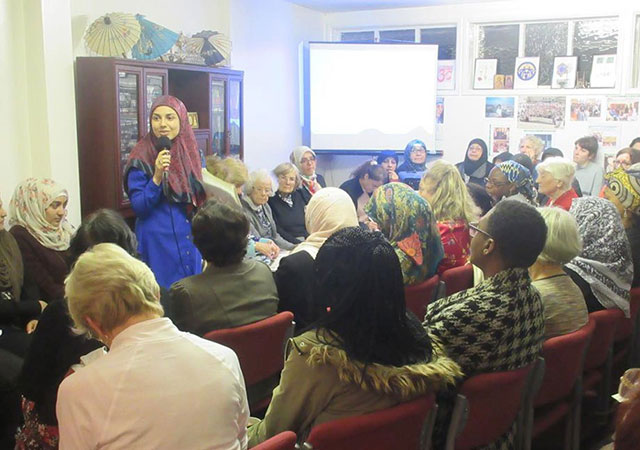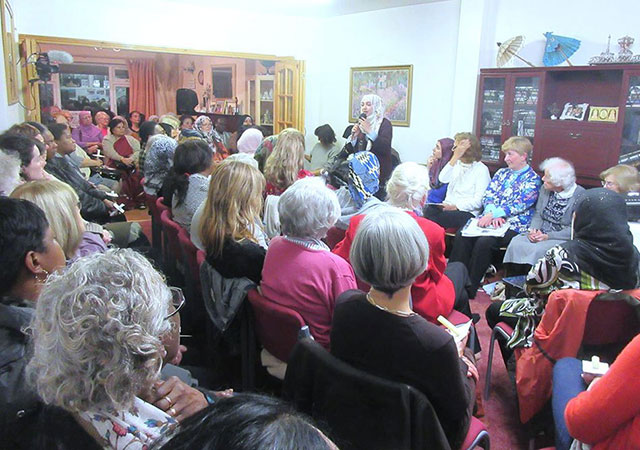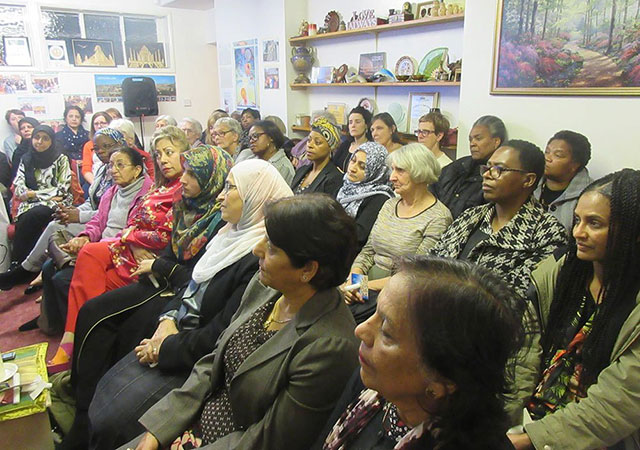UK: Meeting on Peace in the Middle East
UK: Meeting on Peace in the Middle East
WFWP UK
APRIL 2, 2018
WFWP UK had a large turnout for their last Women's Peace Meeting about the Middle East, reflecting the genuine feelings of compassion and concern for the on-going suffering and uncertainty of the people there, particularly women and children who are so often the victims of conflict. Guests heard from five main speakers, watched two interesting videos, had a number of valuable contributions during the discussion, and raised funds for a WFWP project in Jordan that supports refugee families from Syria.
Batool, a chemical engineering student at Birmingham University, and President of the Islamic Society, was first to share. She spoke passionately about the fact that 2017 marked 100 years of occupation for the Palestinian people, whose situation has been out of the main news in recent times, and how they continue to suffer both visible and invisible forms of abuse and humiliation. Batool quoted a figure of 7,000 prisoners held in continuing uncertainty in extremely poor conditions in Israeli prisons, of whom 4,000 are under the age of 15.
A documentary about the situation for Palestinians in the West Bank and Gaza was then shown. A member of the International Women's Peace Service and filmmaker Anna Baltzer documents numerous examples of human rights abuse and shows how she herself has been a supporter of non-violent resistance in the West Bank.
A short video was then shown about the incredible work of the Parents Circle and Families Forum, showing how Jewish and Palestinian families who have all lost a loved one in the conflict work together in search of a lasting solution to end the violence. The project is called "Pain is a Power."
The second speaker was Angela, a retired teacher who set up an organization that teaches weaving and craft-making skills to Palestinian women. She expressed a desire to spend more time with the women and spoke about the negative effects of incendiary weapons in the area, having seen their devastating effects on the population in person.
Next was Asma, a young Syrian woman who arrived in Birmingham about 18 months ago with her family as part of the UK government's program to resettle a small number of Syrian refugees. In Syria, her family lost everything when the war broke out. Asma remembers being terrified and sleep-deprived from the frequent air strikes. She witnessed first-hand the horror and devastation of war. Asma's family managed to stick together and made it to Turkey in 2015. They were later moved to the UK, where Asma has been studying for her university entrance exams with the aim of becoming a pharmacist.
Ismat, who does medical legal work for an orthopaedic surgeon, spoke next about the Lady Zainab project, which helps families in Syria. She traveled there earlier in 2017 and was struck by the large police presence and the absence of men among the refugees and displaced people. She heard about the lack of education in these groups. and later visited a preschool, seeing a lot of energy from the children despite the lack of resources.
Abra, a teaching assistant and recently qualified faith guide in Birmingham, spoke about the Iran Iraq war in the 1980s and how things have become progressively worse in Iraq. She recalls being a 7-year old girl and witnessing the horror of the conflict, with millions of soldiers dying, many of whom were child soldiers.
Helga, an elderly lady, said very simply "I was also a refugee." She also found safety in the UK when evacuated on one of the last Kindertransport trains from central Europe in 1939. She read a prayer and quotation about peace, and reminded the audience that peace requires sacrifice in order to build bridges of respect and understanding.
After several other meaningful contributions, the sharing was brought to a close. The group then lit candles and offered prayers and devotional songs from the different faith traditions represented in the room.



